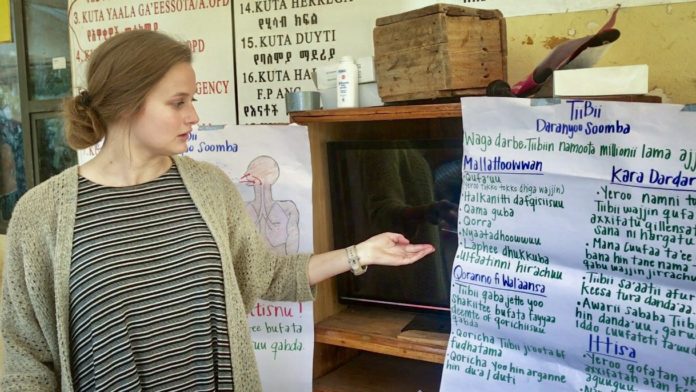
When Kaitlyn Koontz learned her Peace Corps post in Ethiopia would lack running water and reliable power — and that she would be the only American in a village five hours away from another volunteer — her initial reaction was “to turn and run in the other direction.”
“Never in a million years did I think I could live in a mud house or survive without running water or go weeks without speaking English,” said Koontz, who earned her Bachelor of Arts degree from Mercer University’s College of Liberal Arts and Sciences in December 2017. “However, it is truly amazing how quickly you can adapt to all the changes.
“I think that is a lesson for all things in life. Challenges can look overwhelming if you view them from afar, but as you approach them, you realize how manageable they really are.”

Koontz, who majored in global health studies and minored in international affairs at Mercer, arrived in Ethiopia in January 2018. After three months of Peace Corps preservice training, she began her volunteer work as a community health educator in a village of less than 2,000 people in Western Oromia. She works primarily on projects focusing on maternal and child health education, teaching about water, sanitation, hygiene and nutrition.
Koontz works with staff members in the local health center to write lessons about topics they would like her to teach, assist in running town-wide health campaigns, and help write their weekly and monthly reports, which must be typed in English.
Twice a month, the health center holds a vaccination day for children. Koontz uses this opportunity to educate the mothers on a variety of health-related topics, including breastfeeding, handwashing, tuberculosis and HIV.
Educating and nurturing girls
Koontz also works on youth sexual and reproductive health education projects at the local primary school. As part of that, she runs a girls club where eighth-grade girls can discuss goal–setting, planning for the future, self-confidence, and sexual and reproductive health. This includes lessons on menstrual hygiene and re-usable menstrual pads, taboo topics in the region.

“I was watching eighth-grade girls get pulled from school before they could enter high school so they could learn housework with their mothers,” Koontz said. “After watching this for too long, I was highly motivated to create this club for them.”
But it wasn’t easy.
“When I wanted to create the girls club I have now, the male school director told me there was no need for a girls club at his school, so he didn’t approve my request for classroom space,” Koontz said. “After talking with some of my female friends in the village, we came up with the idea to ask for a girls-only English club instead.
“The idea worked, and I was granted the space and time for my girls-only English club. While we did initially use this club for English topics, we quickly transitioned to talking about everyday frustrations my girls face and planning for their futures.”
Koontz also helped run a youth empowerment summer camp called Camp GLOW, which stands for Girls Leading Our World.
“Camp GLOW is my favorite project I’ve completed because I watched so many usually quiet girls come out of their shell when given the opportunity to lead a team event, be the team speaker or complete a creative activity,” she said.
Learning a new language and culture
Among Koontz’s challenges was learning a new language in a community where only three people spoke English. Koontz learned Afaan Oromo, the language or the Oromia Region, and knows a little Amharic, the national language of Ethiopia.

“For the first four months I was in my village, I thought I would never be able to have a full conversation with anyone, but language learning takes time,” she said. “At about the six-month mark, I was beginning to have conversations, read, write and create lessons in the local language.
“Nearly two years later, and I’m still learning new words and better pronunciation.”
Koontz lives in a two-room mud house on the compound belonging to her host family on top of a mountain in the middle of Ethiopia’s coffee forest. She lives near a river, which supplies all the town’s water, and nearly all fruits and vegetables are available year-round. Because of the altitude, temperatures stay on the cooler side, ranging from 50 to 70 degrees.
Coffee is a top export of the region and is a big part of the Ethiopian culture, Koontz said.
“When I’m not working, I am most likely drinking coffee with someone,” she said. “Every morning, afternoon and night I get called to someone’s house for coffee.”
She also plays the Uno card game with her host brothers and watches soap operas with her host mom and sister, if the power is on.

“The best thing about my village is by far the people,” she said. “I have the privilege of living in a community of the kindest and most welcoming people.”
Koontz credits her professors in the Department of International and Global Studies for instilling in her a love of global health, international affairs and international service. Her first international experience was a 2016 Mercer On Mission trip to South Africa, where she volunteered at a school and worked with local nonprofits.
“I’m thankful that I attended a university that prioritizes service, both in our own backyards and halfway around the world,” she said.
Koontz’s Peace Corps service ended in March. She recently was accepted as a Global Health Fellow at St. Joseph’s Clinic, an American-run hospital in Thomassique, Haiti. She will spend the next year creating health intervention projects and increasing community-based health education for the hospital.










